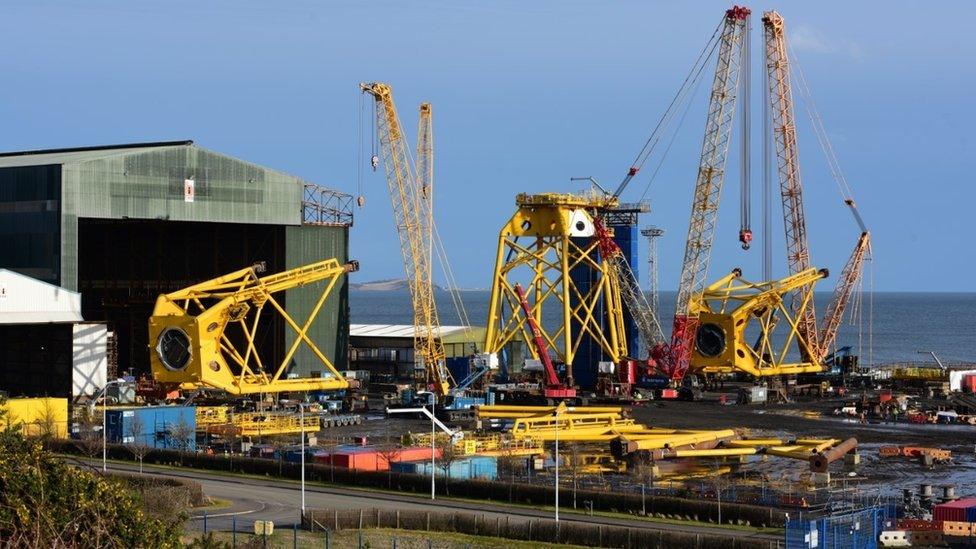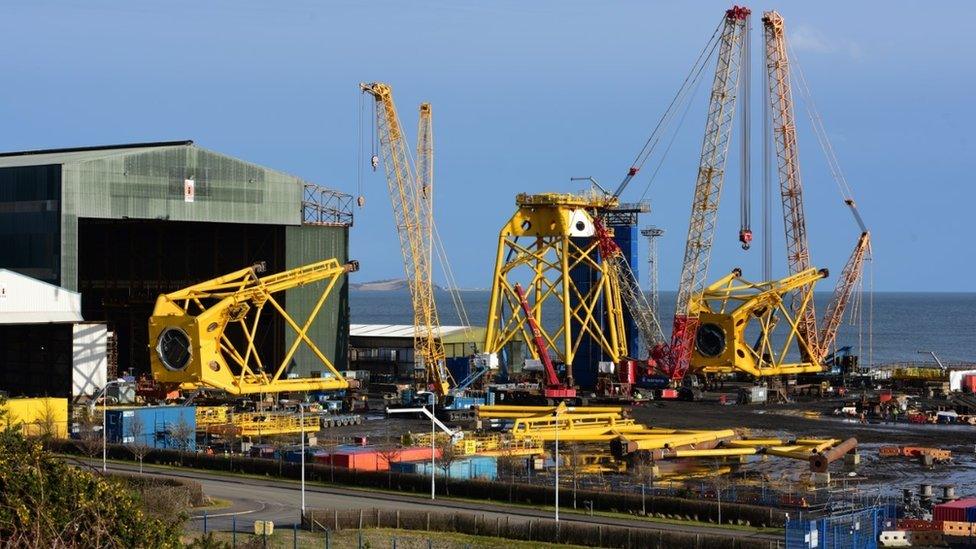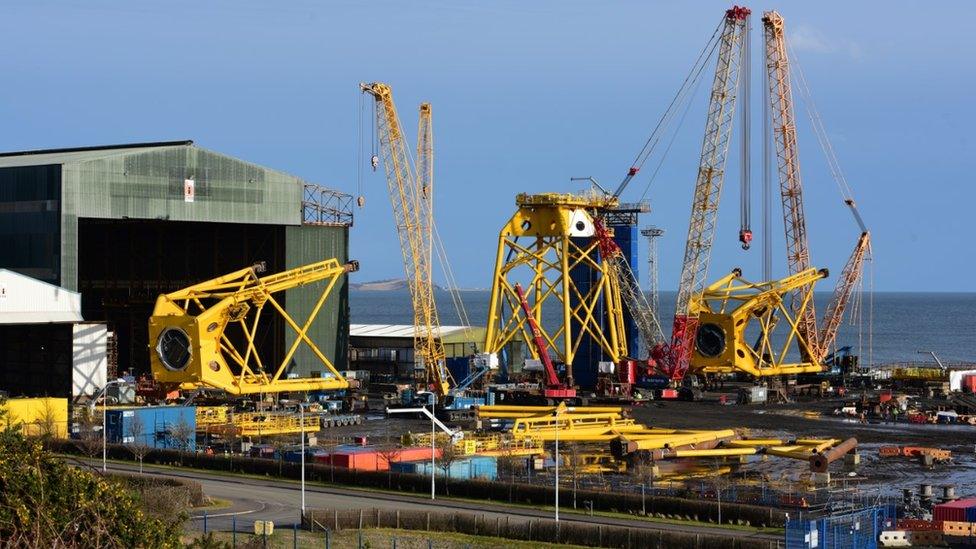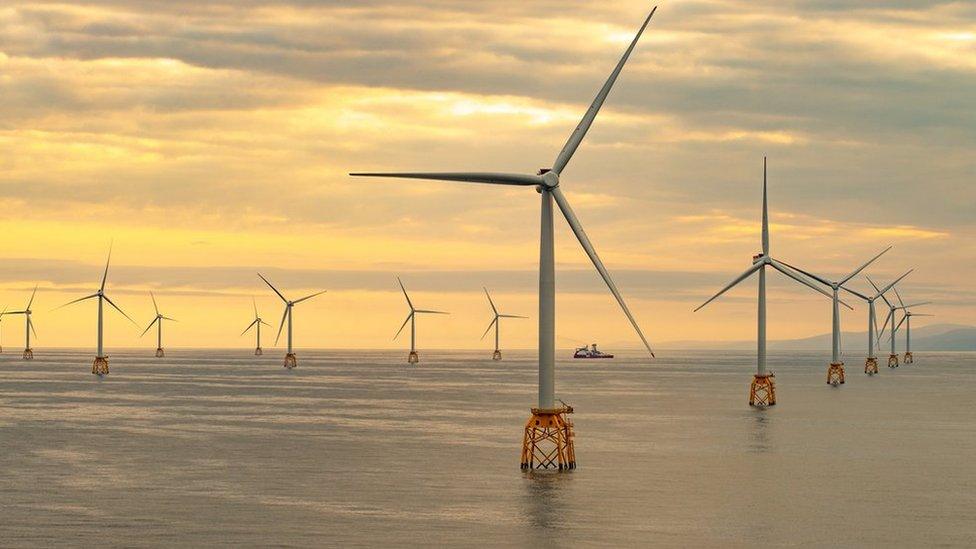The complex battle over the BiFab yards
- Published

BiFab's Methil yard in Fife is one of three currently mothballed
Trade unions are demanding to see Scottish government legal advice that led to an abrupt stop to plans for re-starting work at the BiFab construction yards in Fife and Lewis.
That's while the Scottish government is asking urgently for discussions with the UK government to find ways it could help work together to support the industry.
Scottish ministers are criticising the Canadian firm with a controlling stake in the three yards - at Burntisland and Methil in Fife and one at Arnish near Stornoway - for failing to invest.
Former Prime Minister Gordon Brown, for 32 years a Labour MP in Fife, is weighing in with demands for inquiries at both Westminster and Holyrood into "the BiFab scandal".
There is a complex battle being fought over industrial yards that are currently mothballed.
The BiFab yards are seen as the key to Scotland getting any of the manufacturing benefits from billions of pounds being invested in windfarms on and offshore.
What are the contracts at the heart of the dispute?
The current round of offshore wind farms, which secured a minimum price from government-run auctions, are now in the construction phase.
Scotland has been later to the bonanza than England, having deeper water, higher development costs and higher charges for feeding into the grid. Despite that, it has a much stronger wind resource.
It's gained jobs in development and design, as well as shore-based support, but there's little chance of a blade factory. At least four companies said they wanted to build one in Scotland.
Fabrication of jackets, or platforms for offshore wind turbines, is now the best hope for manufacturing dividends.
In projects being constructed off the coasts of Caithness and Aberdeen, BiFab missed out on contracts. Yards in Spain, the United Arab Emirates, China and Indonesia have been winning the work instead.
The last two big projects in the current round were Seagreen, off the Angus coast and being developed by SSE, and Neart na Gaoithe (NNG), an EDF development to the east of Fife, with a development cost of more than £1.8bn.
BiFab failed to secure work from the Seagreen project, and although EDF said it wanted the Fife yards to build eight out of 54 jackets for NNG, last week the Scottish government withdrew its offer of a £30m financial guarantee backing the contract bid. That effectively disqualifies BiFab from securing that work.
The Scottish government is caught between wanting to support BiFab, with the creation of 450 jobs, while already being deeply invested in it, yet it's accused by critics of "pulling the rug" from under it.
What is the Scottish government's role?
Scottish ministers put £52m into BiFab, when it was facing complete collapse 30 months ago, meaning they have a one-third equity stake, and a £15m loan with the firm. They brokered the deal that brought in Canadian engineering firm DF Barnes as majority shareholder.
Ministers say they are not allowed to commit taxpayer funds under state aid rules. It's understood they could have backed the Seagreen contract, expecting it to be loss-making, but only if a profitable contract for NNG could be expected to follow.
Without any Seagreen work, NNG would be loss-making but with no contracts to follow, probably until 2024. The advice to ministers is that such an arrangement is not commercially viable - therefore barring them from giving the support. DF Barnes is not willing to put up the guarantee either.
It is understood that the Scottish government considered putting BiFab into administration as a means of allowing the government support, but found that did not resolve the problems identified.

A St Andrew's House statement last night added a strong element of frustration at DF Barnes's parent company: "The situation at Bifab is a culmination of a number of issues, the main one being the unwillingness of the parent company and majority shareholder J V Driver to provide working capital, investment or guarantees for the company.
"That is putting the Scottish government in a position that no other minority shareholder could take on in terms of risk, and this is risk to the tax-payer."
At the end of last week, economy secretary Fiona Hyslop sought to resolve the impasse in virtual meeting with the Canadians, the GMB and Unite unions and the Scottish Trades Union Congress. These seemed to intensify criticism of her role.
What do the engineering unions want?
GMB and Unite are working together, and have criticised Scottish ministers: first, for failing to ensure a guaranteed share of work for Scotland, and more recently, for withdrawing the financial guarantee.
They are demanding to see the legal advice to ministers, and they have got their own, from former government legal officer Lord Neil Davidson QC.
That opinion questions why the funds could be offered before, but not now. The Queen's Counsel also questions why Scottish ministers are concerned about European Union state aid rules a few weeks before the UK's departure from the EU.
It concludes that there is a case for a judicial review of the Scottish ministers' decision, which would force them to justify it in court.
In a joint statement on Friday, union officials Gary Smith of the GMB and Pat Rafferty of Unite said: "This veil of secrecy must be lifted. It's neither acceptable nor credible for the Minister to not share the details of the legal advice which prompted the government to walk away from BiFab".
What is the role of the UK government?
It hasn't been involved until very recently. It is currently negotiating the future rules on state aid as part of the arrangements following on Brexit.
The UK government has been in a better position to test the rules, as it is the member state that would answer to the European Commission and ultimately to the European Court of Justice. How that works in future is a highly contentious part of the Brexit negotiations.
The Scottish government would have to mount any such defence through the UK government, and it could not be sure that Whitehall ministers would be up for that battle.
But there have been signals from Whitehall that it may be willing to help. Trade unions and Gordon Brown last week urged Ms Hyslop to seek UK government support, calling on governments to work together.
They criticised her for failing to do so until the last few days. She says she is now seeking an "urgent meeting" to discuss the support the UK government could provide, recognising it does "not face the same legal restrictions as the Scottish government".
What of Gordon Brown's role?

Gordon Brown accuses the Scottish government of making "basic mistakes"
A former Fife MP, the ex-Labour prime minister hasn't given up his involvement in local economic issues, and is now campaigning within a campaign group making the case for the UK union working better together.
He has been speaking to unions, the UK government and DF Barnes. Last week, he backed union calls for unions working together.
This morning he is pushing further, with a call on the economy committee at Westminster to mount an inquiry, and backing Alex Rowley, a Labour ally and Fife MSP, with a call for another inquiry at Holyrood.
Mr Brown commented: "It is becoming clearer by the day that the chances of 450 vital Scottish jobs are being destroyed by basic mistakes by the Scottish government.
"The decision to withdraw support for BiFab was based on incomplete information, dubious financial arithmetic and misleading government statements. Worse, the SNP government chose not to seek support from the UK Government which might have averted this crisis.
Mr Brown continued: "Scotland's offshore wind revolution must not be wrecked by the petty disputes between our onshore politicians. They must work together to save jobs."
While the uncertainty continues, French energy giant EDF has not yet closed the door on the contracts going to BiFab.
- Published21 October 2020

- Published16 August 2019

- Published18 September 2020

